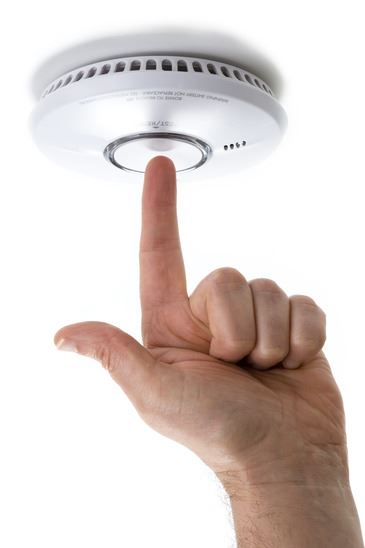One of the most important fixtures in your home for safety and peace of mind is a smoke detector. A combination smoke/carbon monoxide detector should be installed outside every bedroom, within 10 feet of the bedroom door for maximum efficiency.
How long have the smoke alarms been installed in your home? The National Fire Protection Association recommends that smoke detectors be replaced at least every 10 years. Over time, dust gathers inside the smoke detector, desensitizing the sensors. Even if a smoke alarm hasn’t reached the 10-year mark, if you notice a distinctive chirp even after you’ve replaced the batteries or if it doesn’t sound when you perform the recommended annual test of your fire alarm system, it’s time to change them out.
In general, two distinct types of smoke alarm systems may be located in your home: battery-powered and hardwired. Here’s a summary of how the two types of smoke detectors compare on several factors.
Maintenance & Installation
Battery-powered smoke alarms are easier to install. You can purchase them at any big box store and install them in a matter of minutes. With a simple replacement of the batteries, they’ll be operational once again—however, you will have to replace batteries often since this is their only power source.
Hardwired smoke alarms must be connected to your home’s power supply. To do any maintenance work, the power must be off at the main electrical panel before you begin and you should hire a professional electrician for installation. While more work is required to install them, hardwired smoke alarms can be interconnected, meaning if one smoke alarm is activated, it will engage all other alarms in your home. More on this below.
Interconnectability
Battery-powered smoke detectors are stand-alone appliances and will not chain together. With hardwired smoke detectors, they can be connected together so that if one goes off, they all are triggered. This interconnection can save precious minutes if a fire occurs in an area of your house and has a chance to spread before you are fully aware.
Dependability
Battery-powered smoke alarms operate solely through the power they receive from batteries. As batteries weaken, the alarm dulls as well. The length of time it takes to stop working entirely depends on how much battery life was left when the alarm began. Because hardwired smoke alarms are connected to the power supply, they will sound indefinitely until they are turned off. They often have battery backups to ensure they continue in the event the power supply is cut as well.
Our Recommendation: Hardwired Smoke Alarms
Hardwired smoke alarms, while they require slightly more work upfront, are the clear choice if you’re considering replacing your home’s smoke alarm system. You’ll hardly ever have to deal with the annoying “chirping” that occurs when a battery-powered smoke detector begins to go dead, and your entire family will be alerted in the event that a fire does occur since hardwire smoke detectors can be interconnected.
Which type is the right choice for you? If hardwired smoke alarms are in your future, we can help you install and replace your system today. Just give R.S. Andrews of Atlanta a call at (470) 264-8128!

